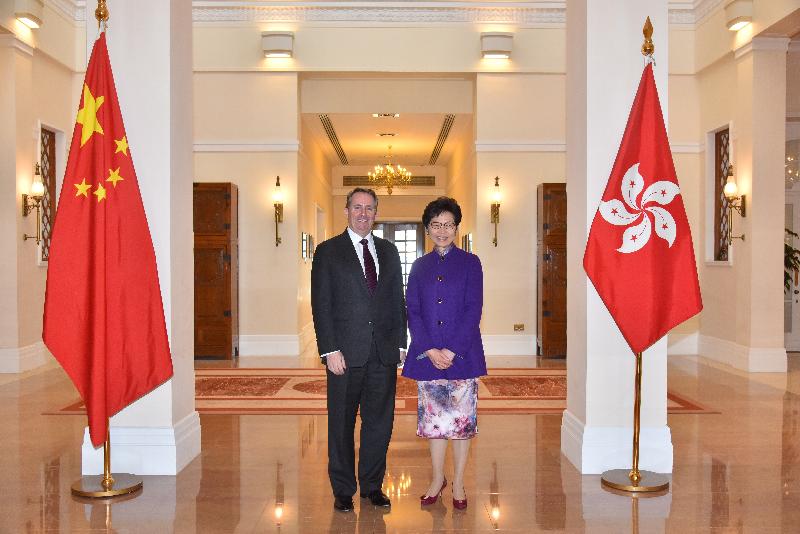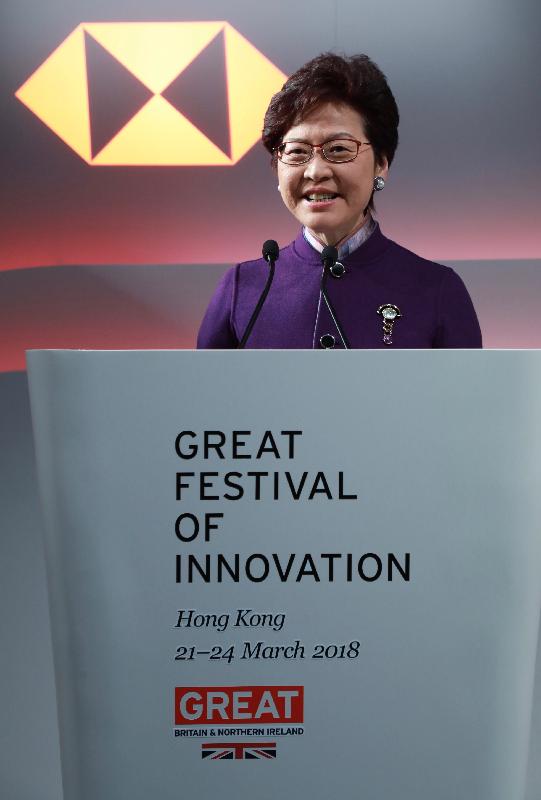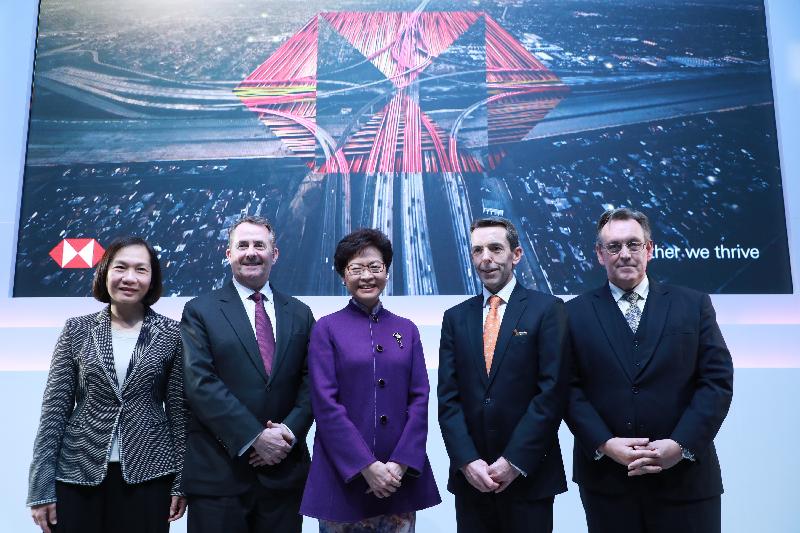Following is the speech by the Chief Executive, Mrs Carrie Lam, at the GREAT Festival of Innovation reception today (March 21):
The Right Honourable Liam Fox (Secretary of State for International Trade of the United Kingdom), Andrew (British Consul General to Hong Kong and Macao, Mr Andrew Heyn), distinguished guests, ladies and gentlemen,
Good evening. I understand that many of you have already sampled a rich day at the GREAT Festival of Innovation in this wonderful venue – a great transformation of the Former Explosives Magazine Compound. I am delighted to join you at this reception to express my sincere thanks to Liam for bringing this remarkably ambitious and decidedly innovative happening to Hong Kong, and to share with you my Government’s commitment to innovation and how this has provided ample opportunities for greater collaboration between Hong Kong and the United Kingdom (UK).
The GREAT Festival of Innovation is the third of its kind after the success of the GREAT Festivals of Creativity in Istanbul in 2014 and Shanghai in 2015. Taking place over four days from today, the Festival showcases the latest in innovative and creative excellence from the UK and Asia, with the aim of fostering new and deeper partnerships between governments and businesses in the UK, Asia, Hong Kong and Mainland China. I am extremely pleased that the UK Government has chosen Hong Kong as the place for building closer ties between the UK and Asia. After all, we are Asia’s world city, the best gateway to Mainland China, and more recently, through a Free Trade Agreement between Hong Kong and ASEAN signed last November, thus positioning ourselves for enhanced links with the Southeast Asian countries. Indeed, my colleague Edward Yau, the Secretary for Commerce and Economic Development, has sent his apology as he is right now leading a business delegation to Cambodia and Vietnam to promote trade and investment links.
Hong Kong and the UK have long enjoyed
multifaceted relations. Ours is a singular bond, one I am determined to sustain and build on. It was therefore no accident that my first overseas trip out of Asia as Chief Executive was to London, and this took place in my third month in office. During my visit, Liam and I talked about boosting trade ties in a post-Brexit Britain. Indeed, our two economies that month initiated a Strategic Dialogue on Trade Partnership, jointly examining sectors and industries ripe for boosting our ties and bilateral trade. Our dialogue continued when we met on the margins of the World Economic Forum in Davos in January this year.
In the meantime, let me congratulate the Secretary of State for his staunch support and advocacy of free trade, especially amidst the growing threat of protectionism, as demonstrated in his extensive travels and engagement of trade partners and the work of the Department for International Trade which he leads. Tasked to deliver a new trade policy for the UK, I am sure the Department for International Trade will embrace innovation, partnership and inclusiveness in its endeavours. These qualities are aptly embedded in the central statement of this GREAT Festival of Innovation, and I quote, “Now, more than ever, we must look to the future and work with partners who share our creative spirit. Collaboration will unlock new ideas, technologies, markets and opportunities.”
Unlocking new ideas and applying technologies is one of the main themes in my inaugural Policy Address delivered in October last year. I spoke at some length about the promise of innovation and technology for Hong Kong, its potential in helping to diversify our economy, improve livelihood and create quality jobs for young people, as well as committed to a clear strategy for innovation and technology development in Hong Kong. Three weeks ago, our Financial Secretary delivered his annual Budget Speech and allocated more than HK$50 billion – that is about 4.5 billion pounds – to accelerate innovation and technology development in Hong Kong.
Among the measures is the establishment of two research clusters on healthcare technologies and artificial intelligence and robotics technologies, to attract the world’s top scientific research institutions and technology enterprises to Hong Kong for conducting more midstream and downstream research and development projects in collaboration with local universities and scientific research institutions. A bill to introduce tax incentives for corporations to increase spending on research and development will shortly be introduced. The many top institutions and enterprises in the UK, some of which I interacted with during my last visit to London, are clearly our targets.
We are also in the midst of remaking Hong Kong into one of the world’s smart cities, transforming the way we live and work. In December last year, we unveiled the Hong Kong Smart City Blueprint. It sets out our vision for building a smart Hong Kong powered by a thriving economy and a high quality of living. A good deal of that is already well established. Our telecommunications network, for example, is world class, with fixed and mobile broadband speeds and penetration rates among the highest anywhere.
At the same time, there is a lot of potential in applying innovation and technology in many industries. For example, Hong Kong has long been renowned for its high-rise infrastructure, as well as the construction, design and management industries that support it. We are looking to innovation and technology to drive its future. My Government will help lead the way, as beginning this year, we will adopt Building Information Modelling technology in the design and construction of major government capital works projects. And we are setting up a HK$1 billion Construction Innovation and Technology Fund to encourage industry to adopt innovative technology.
We see the advantage, too, of expanding the reach of innovation and technology in government. Plans include heightened training in innovation and the application of technology for our civil servants. In addition, a big-data analytics centre will be in place by 2020, introducing real-time data transmission and sharing among government departments. In the coming year, we will also adopt public cloud services for government departments. Soon after, we will revamp the government’s cloud infrastructure, enabling digital services delivery among government departments, service providers and others. A soon to be established Policy Innovation and Co-ordination Office will be tasked to review existing legislation and regulations with a view to removing outdated provisions that impede the development of innovation and technology. We are also examining government procurement to make sure that innovative solutions will not be overlooked.
In the end, of course, our resources, funding and support are focused overwhelmingly on creating an enabling environment for business and business innovation. In this regard, we are applying innovation and technology to retool our pillar industries and to spark entirely new industries, creating careers and wealth that reward us all.
We are focused, in short, on building a new model of development. This Festival surely underlines the creative and entrepreneurial spirit that drives the collaboration between Hong Kong and the UK. It was also the catalyst for a joint statement on “Closer Collaboration between the UK and Hong Kong on Trade and Economic Matters”, which was announced earlier today.
That statement naturally embraces free trade. Hong Kong and the UK enjoy close trade ties, and our bilateral trade increased 4.4 per cent last year. The UK was Hong Kong’s 13th largest global trading partner in 2017. In services, the UK was our third largest partner in 2015. And the UK, at the end of 2016, was Hong Kong’s eighth-largest source of inward direct investment. Not surprising, with more than 670 UK companies doing business in Hong Kong, and using Hong Kong as the gateway to markets in Mainland China and throughout the Asia region.
The joint statement also singles out creative industries and the promise they hold for our two economies. In 2016, Hong Kong’s creative industries employed about 135 000 professionals in areas ranging from design and the arts to communications, animation and film. Hong Kong has long been a global centre for filmmaking and film talent. Over the past two years, some 30 UK production companies have turned to Hong Kong for location shooting. And Hong Kong looked to the UK for some HK$3.8 billion worth of creative goods in 2016, from jewellery to books, particularly, I’m told, children’s books.
The joint statement also spotlights the priority our two economies place on innovation, research and development, underlining the opportunities that innovation and technology offer Hong Kong and the UK – at the governmental, business and institutional levels. A good start is the signing of the Hong Kong-UK Fintech Bridge Agreement, which I witnessed while in London. It opens wide the door to expanded fintech co-operation between us.
All in all, we look forward to working with our good friends and GREAT partners from the UK – today, tomorrow and long down the innovation road. Here, my thanks go to the British Consulate for organising the GREAT Festival of Innovation. Spread over four days and nights, the GREAT Festival features more than 120 high-profile speakers, spotlighting everything from smart cities to the future of free trade and the Belt and Road Initiative. Fashion, food, travel, storytelling and a GREAT deal more too. I am sure everyone will enjoy it, and many collaboration opportunities between Hong Kong and the UK will be identified.
On that note, I wish you all a memorable festival and a GREAT year ahead! Thank you.


